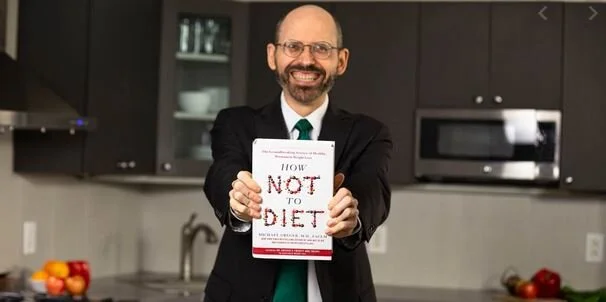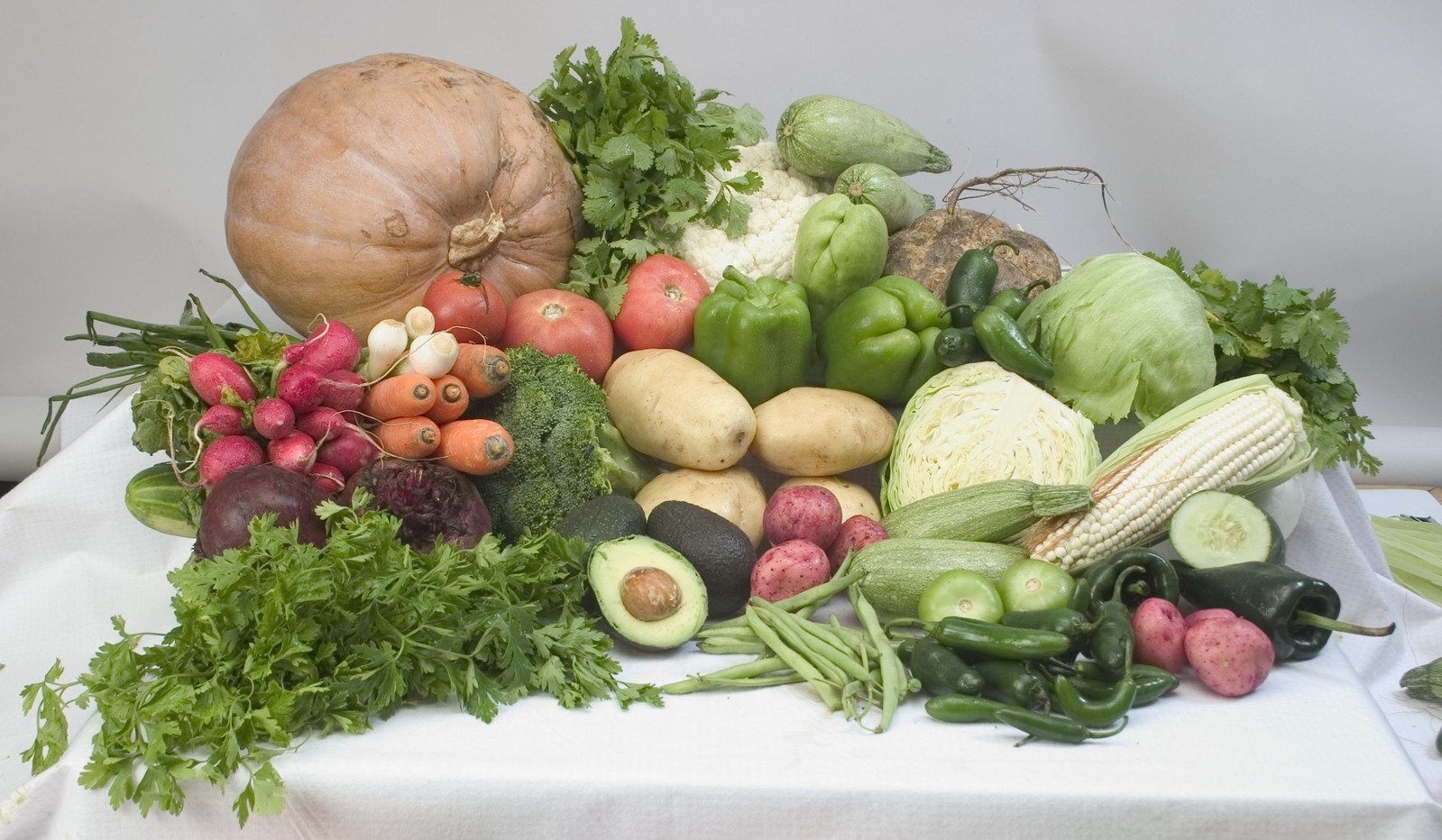How Not to Diet and the Science of Veganism
Michael Greger, M.D., the best-selling author and creator of the exceptional online resource, nutritionfacts.org, is out with a new and exhaustively researched book, How Not to Diet. It’s a seemingly definitive examination of optimal nutrition, how certain foods contribute to obesity and sustainable, evidence-based weight loss. Books like this have made Dr. Greger the nerd hero of vegans everywhere.
Dr. Greger has the rare ability to make science accessible to lay persons, explaining, with wit and humor, the biochemical impacts of various foods on our weight and health. He also describes how an alliance of government, corporate food producers and big pharma promotes the highly profitable, disease-friendly foods that are at the heart of the obesity epidemic.
Even if you’re not interested in the science of nutrition or in food politics, you might want to check out numerous practical, evidence-based tips, including inexpensive foods and spices that assist weight loss, optimal meal timing, negative calorie preloading and more.
Dr. Greger recently came to Maui to discuss his latest book, and we were interested to hear what he had to say.
When a Calorie is Not a Calorie
“Isn’t weight loss just about eating less and moving more?” Dr. Greger asks his audience of nearly 300 that packed the Kihei Community Center last February. “Isn’t a calorie a calorie? That’s what the food industry wants you to think. Different foods have different amounts of calories per stomachful. This is the concept of calorie density. Oil has a high calorie concentration. A tablespoon of oil has about 100 calories. For the same calories, you could eat two cups of blackberries.
“The notion that a calorie from one source is just as fattening as a calorie from any other is just a trope broadcast by the food industry to absolve itself of culpability. It’s true that in a tightly controlled laboratory setting, 240 calories of carrots would have the same impact as 240 calories in a bottle of coke, but the comparison falls flat on its face out in the real world. You could shove those liquid candy calories down in less than a minute, but eating 240 calories of carrots would take two-and-a-half hours of constant chewing. You might not be able to fit all of them in your stomach. In a lab, a calorie is a calorie, but in life, far from it.”
Many traditional weight loss programs, Dr. Greger notes, focus on reducing portion size and leave dieters feeling hungry and unsatisfied. What if people instead ate more healthful food with low caloric density? This experiment was put to the test when Honolulu physician Terry Shintani and colleagues placed people on diets that included unlimited quantities of fruits, vegetables whole grains and beans. They lost average of 17 pounds in 21 days eating more food, not less.
The Single Best Diet
Dr. Greger states unequivocally that for losing weight, one diet stands above all of the others. “I have scoured through the medical literature and all the randomized control trials, and the single most effective weight loss intervention ever published in the peer-reviewed scientific literature is a whole food, plant-based diet.”
He points to research conducted by New Zealanders published In 2017 called the Broad Study. A control group of individuals received standard medical care, and another group received classes in maintaining a whole food diet based on plants, grains and legumes. “No significant changes occurred in the control group. The plant-based group, able to eat all the healthy food they wanted, lost an average of 19 pounds by the end of the three-month study.”
Even more impressive, at the six-month mark, the plant-based group lost an average of about 27 pounds. “The plant-based group was feeling so good both physically and mentally and was able to come off so many of their medications, that they were sticking with the diet on their own, and the pounds continued to come off,” Dr. Greger explains. “The whole food, plant-based diet achieved the greatest weight loss compared to any other ever published in the medical literature.
“If you put people on a diet packed with fruits, vegetables, whole grains and beans and allow them to eat as much as they want, they end up eating about fifty percent fewer calories than they might have otherwise, just as full on half the calories.
Losing Weight Through Plant-Based Eating
“Those eating more plant-based appear to be effectively burning more calories in their sleep,” notes Dr. Greger. “The resting metabolic rate of those eating more plant-based may be 10% higher or more, a boost in metabolism that can translate to the burning of hundreds of extra calories a day more without doing a thing. No wonder those who eat more plant-based tend to be slimmer. Start packing your diet with real food that grows out of the ground, the pounds should come off naturally, taking you down towards your ideal weight.
“It just so happens to be the only diet ever proven to reverse heart disease in the majority of patients. If that’s all a plant-based diet can do, reverse the number one killer of men and women – shouldn’t it be the default diet until proven otherwise? The fact that it can also be so effective in preventing, arresting and reversing other leading killers like type 2 diabetes and high blood pressure would seem to make the case for plant-based eating simply overwhelming. The single healthiest diet also appears to be the most effective diet for weight loss.”
So why aren’t more doctors singing the praises of whole food, plant-based diets to their patients?
“Surely, if there’s some safe, simple side-effect-free solution to the obesity epidemic, we’d know about it by now, right?” asks Dr. Greger. “I’m not so sure. It may take an average of 17 years before research findings make it into day-to-day clinical practice. Decades ago, Dr. Dean Ornish and colleagues published, in one of the most prestigious medical journals in the world, that our number one killer [heart disease] could be reversed with diet and lifestyle changes alone. Yet hardly anything changed. Even now, hundreds of thousands of Americans continue to die needlessly every year from what we learned decades ago was a reversible condition.”
What About Just a Little Meat?
“Today, even our meat can be considered junk food,” states Dr. Greger. “For more than a century, one of the major goals of animal agriculture has been to increase the carcass fat content of farm animals. Take chicken, for example. A hundred years ago chicken contained less than 2% fat. Chickens have been genetically manipulated to have 10 ten times more fat. Chicken Little has become Chicken Big, and maybe making us bigger, too. Meat consumption in general is associated with weight gain, but poultry appears to be the worst. Even an ounce a day, a single chicken nugget, is associated with weight gain compared to eating no chicken at all.
“Animal protein also spikes insulin levels, while whole plant foods have been found to cut insulin response. Why? Because plant proteins tend to be lower in branched chain amino acids, which are associated with insulin resistance, the cause of type 2 diabetes.
“Those who start out more plant-based but then add meat to their diet at least once a week or more appear to double or triple their odds of diabetes, stroke, heart disease, weight gain and suffer an associated 3.6-year drop in life expectancy. That’s going from no meat to just once-a-week meat or more. Low-carb diets have been shown to impair artery function and worsen heart disease, whereas whole food, plant-based diets have been shown to actually reverse heart disease. That’s what Ornish used.”
The Bottom Line
“If there was just one piece of advice that wraps up my entire book, How Not to Diet, the recommendation would be to wall off your calories,” advises Dr. Greger. “Animal cells are encased only in easily digestible membranes, which allow the enzymes in our gut to effortlessly liberate the calories within a steak, for example.
“Plant cells, on the other hand, have cell walls that are made out of fiber, which acts as an indigestible physical barrier so that many of the calories remain trapped inside Now, of course, processed plant foods – fruit juice, sugar, refined grains, even whole grains that have been powdered into flour – have had their cellular structures destroyed, their cell walls cracked open, and their calories are free for the taking.
“But when you eat structurally intact plant food, chew all you want, you’re still going to end up with calories completely encapsulated by fiber, which then blunts the glycemic impact, activates your ileal brake and provides sustenance to our friendly [gut] flora.
“Our entire physiology is presumed to have evolved in the context of what the rest of our great ape cousins eat, and that’s plants. The Paleolithic era when we started using tools only goes back about two million years. We know the great apes have been evolving since back in the Miocene era, more like 20 million years ago.
“So, for the first ninety percent of our hominoid existence on this planet, our bodies evolved on mostly plants. It’s no wonder, then, why our bodies may thrive best on the diet we were designed to eat, so maybe we should go back to our roots.”




